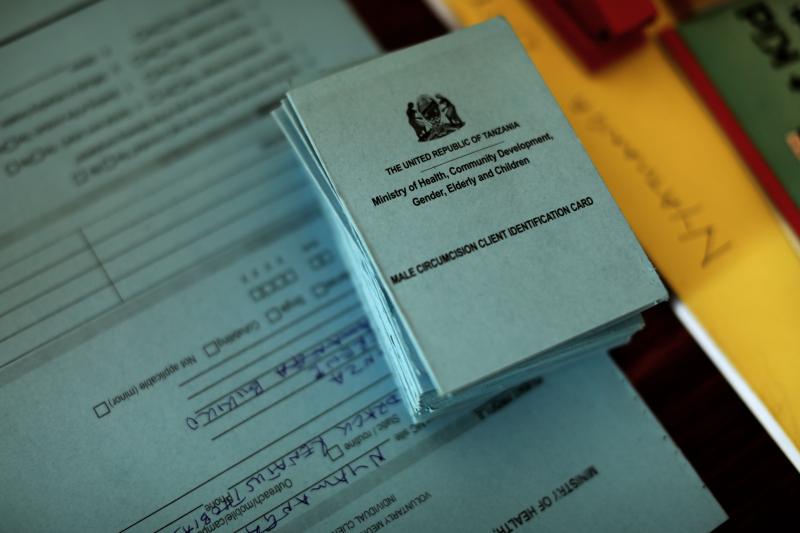Where We Work
See our interactive map


A male circumcision client identification card in Tanzania. Photo by Josh Estey for IntraHealth International.
In the midst of the COVID-19 pandemic and its halting effects on health services around the world, Tanzania’s northern regions of Mara, Mwanza, Shinyanga, and Simiyu have provided crucial HIV services to over 186,000 adolescent and adult men, exceeding their target success rate by 117% through the Tohara Plus project.
The IntraHealth-led project—which is funded by the President's Emergency Plan For AIDS Relief (PEPFAR) and the US Centers for Disease Control—has provided HIV services in Tanzania since 2016 to help the country tackle its HIV epidemic sustainably while also working toward the country’s vision of an AIDS-free generation. PEPFAR has been at the forefront of achieving these HIV goals and has invested over $85 billion in the global HIV/AIDS response since 2003, saving over 18 million lives, preventing millions of HIV infections, and achieving HIV/AIDS epidemic control in more than 50 countries around the world. One of these critical services is voluntary medical male circumcision (or VMMC), a procedure that reduces a man’s risk of acquiring HIV through heterosexual intercourse by about 60%).
Tohara Plus provides VMMC services in four northern regions of Tanzania and has been exceeding targets since its inception, but in early 2020, COVID-19 threatened to halt all of the project’s VMMC activities. After temporarily stopping outreach and campaign services in the spring, the Tohara Plus team worked quickly to adapt services to follow COVID-19 safety guidelines in 71 static sites in more remote locations to sustain VMMC services.
Because of this rapid response, they met and even exceeded their adjusted 2020 targets and have continued to provide VMMC services during the pandemic. The team’s achievements include:
“Our team has a really strong relationship with the government—and we involve and engage them from the national level to the community level,” says Lucy Mphuru, country director and Tohara Plus project director. “We orient them on all our activities from the beginning, do joint programming to scale up solutions together, and often get ideas from them that we would never have thought of. It’s a great example of country ownership and it’s more sustainable. The model of this approach could be used in most understaffed regions to get stronger results like these in a shorter time.”
And while the project exceeded its overall target, so did each region, including Shinyanga (119%), Mara (117%), Mwanza (116%), and Simiyu (112%). Tohara Plus ensured client follow-ups were reviewed daily and if anyone missed their appointment, clients were traced through their mobile phone numbers and reminded to reschedule. By the end of the year, all sub-national units had also surpassed their annual targets while maintaining the quality and safety of VMMC services.
The project also provided technical assistance on early infant male circumcision (EIMC) through three centers of excellence—Nyamagana Hospital (Mwanza), Kahama District Hospital (Shinyanga), and Meatu District Hospital (Simiyu)—established by IntraHealth, the Tanzanian Ministry of Health and government of Tanzania in 2019 with 53 trained EIMC providers. In early 2020, 402 infants under two months old received services through these sites.
Tohara Plus used the SMART (specific, measurable, attainable, relevant, time-bound) advocacy approach and human-centered design while working with local leaders, influencers, and volunteer community agents to understand and break down the barriers that keep potential clients from seeking VMMC services. Volunteer community agents and popular opinion leaders communicated one-on-one with prospective clients and shared information with and booked appointments for them in nearby static and satellite facilities. A total of 150 public opinion leaders tailored their responses, answered questions, and gave information to 13,791 prospective VMMC clients.
The project also identified specific strategies and tailored them to regions based on the challenges clients in each area faced. For example, in small mining communities without a nearby health facility, Tohara Plus provided transportation to the facilities for clients to help them access services.
To ensure high-quality services, the program continued intensive mentorship and clinical coaching, refresher trainings, and close supportive supervision to make sure health workers could recognize, categorize, manage, document, and report VMMC-related adverse events. The project also focused on data quality and conducted monthly quality checks with government partners.
To reach remote areas of Tanzania, Tohara Plus is now deploying three mounted mobile clinic vans to expand services and target hard-to-reach adult men with “men-friendly” services. The vans help to maintain services during COVID-19 by providing care in a project-controlled environment, reducing congestion at health facilities, and minimizing the distance some clients must travel to access services.
IntraHealth’s Tohara Plus Project leads a consortium that includes two local partners—the Tanzania Youth Alliance (TAYOA) and IntraHealth’s local affiliate, AFYA Plus. It is funded by the US Centers for Disease Control and Prevention under the President's Emergency Plan for AIDS Relief.
The Tohara Plus team was included as one of the 11 case studies in the World Health Organization’s Case Studies on Enhancing Uptake of Voluntary Medical Male Circumcision. You can read their case study, Triangulating Data to Direct VMMC Strategies for Reaching Uncircumcised Males in the Lake Zone Region, United Republic of Tanzania, here.



